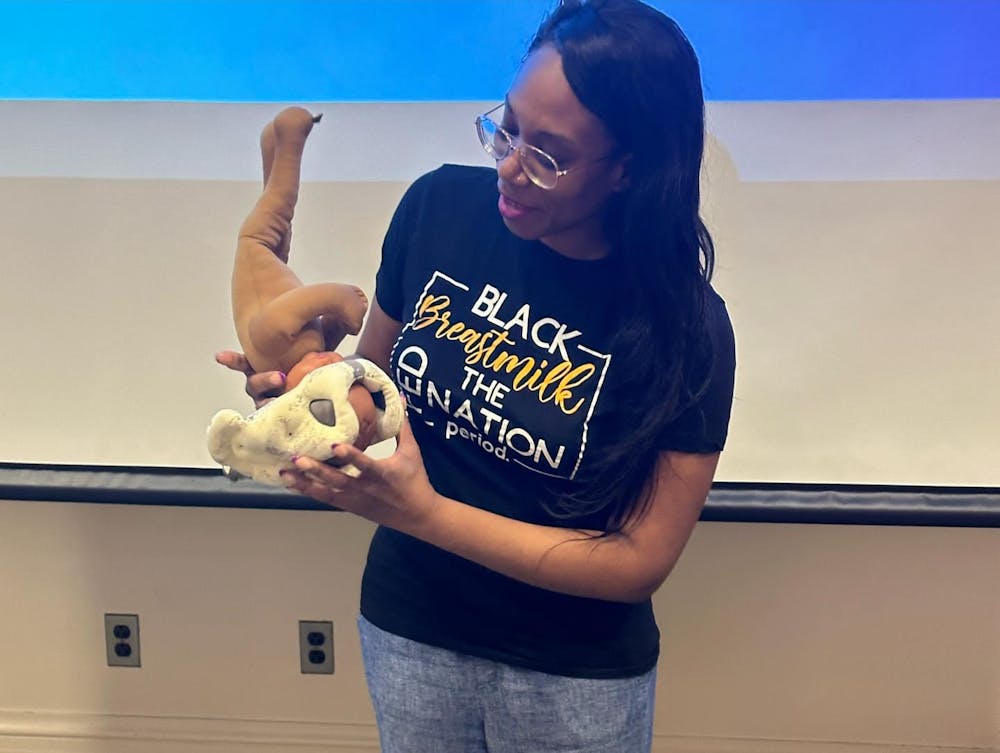By Liz Ciocher
Features Editor
With the combined efforts of Dr. Natasha Patterson and Professor Ria Rodney, the College has launched its first doula training course.
The course, officially listed as “Foundations in Community Birth Work, The Doula Method,” will provide students with official doula certification upon passing completion.
Doulas are emotional support professionals who help people through all stages of pregnancy, including early stage pregnancy, delivery and postpartum birth. While they are not clinically trained, they serve a strong role in the maternal process.
“A doula is a ‘help mate,’” said Rodney, one of the course instructors. “They’re there to help the mom; they’re just providing emotional support and comfort for that person. People can get very sick with their pregnancies, and doulas have been proven to reduce the rate of morbidity and mortality surrounding pregnancy.”
The sickness and ailments of people undergoing pregnancy have contributed to a maternal health crisis in the United States, with New Jersey having one of the worst maternal mortality rates in the country. The rise of this conflict is what got our professors thinking about how the College can make a difference.
“Four/five years ago we started working with Tammy Murphy’s office to work with them on developing a strategic plan to deal with the maternal health crisis in New Jersey,” Patterson said. “A lot of [Murphy’s plan] said to train doulas and midwives and things like that, so, Ria Rodney, who is a WGSS adjunct here, approached our chair and she asked if we would want to do a course on it.”
According to the instructors, the entire process of creating the upper-level seminar course took nearly four years, with the process including a proposal, public health department approval, curriculum development and student application approval.
Rodney is previously doula certified, while Patterson will be receiving her certification alongside the students enrolled in the course.
Applying students wrote essays and participated in interviews with the instructors explaining why they were interested in taking the course.
“I actually wasn’t expecting to get into it,” said Camille Clemente, a junior public health major. “But I’m really grateful to be one of the first ones to experience this. They definitely planned it really well. I already see the work they put in is really showing.”
The 16-student course meets every Wednesday and fulfills requirements for both Public Health and Women’s, Gender and Sexuality Studies. It is an upper level seminar, but it is not confined to a certain major or department.
“We have nursing students in the course, psychology, biology, education–a number of different majors,” Patterson said. “Anybody can take the course. They just have to have the prerequisites – foundations of behavioral science and things like that.”
Over the semester, the students will finish four books to prepare them for their doula training. The books teach the students about topics that are not always accessible during hands-on training, such as advocacy, mental health, trauma and domestic violence.
In addition to their Wednesday class time, the syllabus details 16 hours of hands-on skills training, which every student completed earlier this month. Nikia Lawson, a certified doula trainer, worked with the students and instructors for two days from 9 a.m. to 6 p.m.
Lawson’s instruction included lectures as well as hands-on practices. In addition to learning about the physical practices with their assigned families, they learned about the occupational side of the trade.
“It was a long but really great training, the person we worked with had a wealth of knowledge,” said senior biology major Samielle Taylor. “She had such great energy, and she really showed us the ropes as far as not only what it means to be a doula but also the business aspect of things and how to get ourselves off the ground in the doula business.”
Now that the students have completed their hands-on training, the process of assigning them to real-life families has begun. Here, they will work directly with the families, shadowing a certified doula before they are assigned to a family of their own.
The spread of information about doulas and how they can help families is a small step in resolving the maternal mortality crisis affecting New Jersey.
“I thought, ‘How can I expand doula resources?’” Rodney said, “and I think college students are great to get involved in this work. They are very passionate about healthcare. I wish I had this opportunity as a student. Doulas are just one part of solving this [maternal health crisis].”
For some students, making this difference is personal.
“I myself am a mother, and I didn’t know what a doula was, how to get one, the support or the number of resources they had to offer,” said Taylor. “I feel like the more people in the community that know about this resource, the better.”
According to the Office of the Governor, New Jersey has one of the widest racial imbalances when it comes to both maternal and infant care. Patterson and Rodney hope this course will help to combat these issues.
“My driving force is knowing there are a lot of people in the birthing space, especially OBGYN, who are white males who will never know what giving birth is like,” Taylor said. “We're putting our birthing process in their hands, and having someone there for support who has lived experiences and firsthand knowledge to know what it's like to be a woman and woman of color while navigating some of these systems is important.”
Based on the progress of the course’s first run this semester, both Patterson and Rodney hope to continue the course’s run for years to come.
“I’m really impressed with our students, and I'm really proud of them,” Rodney said. “I know they are going to provide excellent care to our families in Trenton and can’t wait to see how much they accomplish this semester.”







